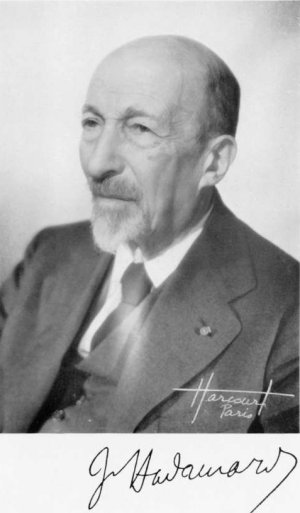Jacques Hadamard (nonfiction)
Jacques Salomon Hadamard ForMemRS (8 December 1865 – 17 October 1963) was a French mathematician who made major contributions in number theory, complex function theory, differential geometry and partial differential equations.
In his book Psychology of Invention in the Mathematical Field, Hadamard uses introspection to describe mathematical thought processes. In sharp contrast to authors who identify language and cognition, he describes his own mathematical thinking as largely wordless, often accompanied by mental images that represent the entire solution to a problem. He surveyed 100 of the leading physicists of the day (approximately 1900), asking them how they did their work.
Hadamard described the experiences of the mathematicians/theoretical physicists Carl Friedrich Gauss, Hermann von Helmholtz, Henri Poincaré and others as viewing entire solutions with "sudden spontaneousness".
Hadamard described the process as having four steps of the five-step Graham Wallas creative process model, with the first three also having been put forth by Helmholtz: Preparation, Incubation, Illumination, and Verification.
The ideas in Hadamard's 1898 paper on the geodesics on surfaces of negative curvature will later been seen as an early development in symbolic dynamics.
In the News
Fiction cross-reference
Nonfiction cross-reference
- Complex analysis (nonfiction)
- Differential geometry (nonfiction)
- Maurice René Fréchet (nonfiction) - Doctoral student
- Carl Friedrich Gauss (nonfiction)
- Marc Krasner (nonfiction) - Doctoral student
- Paul Lévy (nonfiction) - Doctoral student
- Szolem Mandelbrojt (nonfiction) - Doctoral student
- Mathematics (nonfiction)
- Number theory (nonfiction)
- Partial differential equation (nonfiction)
- Émile Picard (nonfiction) - Doctoral advisor
- Henri Poincaré (nonfiction)
- Symbolic dynamics (nonfiction)
- Jules Tannery (nonfiction) - Doctoral advisor
- Hermann von Helmholtz (nonfiction)
- André Weil (nonfiction) - Doctoral student
External links:
- Jacques Hadamard @ Wikipedia

